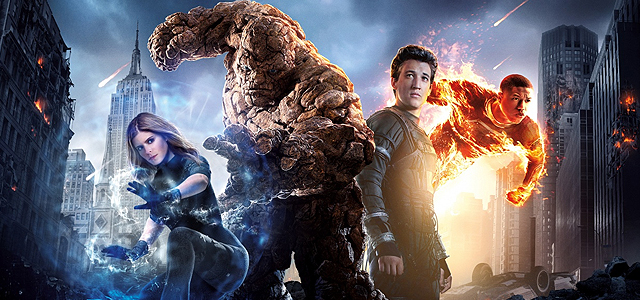(M) Starring: Kate Mara, Miles Teller, Michael B. Jordan, Jamie Bell
“With every new discovery, there is risk. But we are stronger together than we are apart.” — Dr. Franklin Storm
It is hard to believe that it has been ten years since the original Fantastic Four film but, in 2015, we are being introduced to a new and younger foursome. Director Josh Trank (Chronicle) takes on the retelling of this familiar comic-book tale, but takes it all the way back to a youthful time in the lives of the team.
The central focus is Reed Richards (Miles Teller), who we see go from ‘misunderstood child genius’ stage to recruitment by a powerful company for his technological abilities with quantum transport. Yup, quantum transport. That’s a thing.
As Richards is introduced to a fateful pack of geniuses, their journey begins, building friendships as well as the technology that will eventually inflict super-powers upon them. When Richards and his fellow geniuses finish their project and transport to a new planet, they come in contact with its mysterious transformative properties. This groundbreaking trip leads to the loss of a counterpart and the gaining of unexplained physical abilities. While the government attempts to get back to this new planet of possibilities, Richards and his three contemporaries must learn to manage their new skills. Despite issues and angst, they still resolve to team up in a bid to defeat a new enemy, Dr. Doom (Toby Kebbell).
If director Trank has proven anything throughout his short directorial career, it’s his ability to recruit some of the best young talent in Hollywood. In Fantastic Four he assembles a wonderful central cast for this origin story. Miles Teller (Whiplash), Kate Mara (House of Cards), Michael B. Jordan (Chronicle) and Jamie Bell (Jumper) provide the grounding that a proper reboot needs. At first glance, then, this reboot seems to be setting up a trailblazing experience along a well-worn trail of superhero legend.
The story steadily has promise through the first half of Richards’ origin story. But then something goes horribly wrong with the script and direction. The primary problem is that Richards had been established as the central character, yet he goes missing for the whole second act. Without this apparent leader at the helm of the story, it becomes rudderless and loses its heart.
In the third act, the writing becomes merely elemental and clichéd. What should be a tension-filled climax to the inevitable battle between the four friends and their enemy, proves to be little more than a forgettable conclusion to a misguided narrative. Fantastic Four is disappointing in that the potential strength of the first half of this film could not translate into a better second half.
Trank may have a knack for young talent, but fails to provide the right players to perform the menacing government officials and that of the villain. Yet again, as with too many cinematic adventure, the villain is the primary disappointment. In the beginning, Kebbell plays the brooding loner well, but cannot act his way out from behind the blank mask and effects that he is made to perform with. This is not a reflection upon his acting abilities as much as it is a comment upon a poorly crafted script and character design that fails to provide a formidable foe for the four young heroes. Fantastic Four boils down to being a lesson for a young director of superhero film: the heroes are only as interesting as the villain they must battle.
Before seeing Fantastic Four, it’s fair to presume that it must be going to provide fresh chemistry in an overworked genre. Otherwise, why would film-makers bother to go back for more Four? But the on-screen results never seem to make their way out of the laboratory, and offer no clear reasons for why Trank and his team rebooted Fantastic Four.
Even in a less than satisfactory package, there are still a multitude of different ideas to ponder. This team-focused story lends itself to discussion around unity, collaboration and the value of each part of any community. The heart of the story can be found at the point when Dr. Franklin Storm (Reg E. Cathey) talks about his belief in the young Fantastic Four and their ability to work together.
As can be expected, this belief is misplaced, which consistently proves to be the case when you put all of your faith in humanity. Time and again, humanity will let you down. Yet, the discussion of belief does not have to be hopeless; there is more to consider on the topic of belief or faith. Is it in humanity or is it in something outside of ourselves that faith should be placed? Should belief be in god-like superheroes or should it be in God? Something fantastic that is worth considering.
What are some of the bigger questions to consider from this film?
- What really matters when it comes to heroics? (1 Samuel 16:7, Matthew 13:31-32)
- Can we become better as humans?’ (Genesis 1:27, Mark 7:20-23)
- Can mankind’s hearts change from evil to good? (2 Corinthians 5:17, 2 Timothy 2:21)
Russell Matthews works for City Bible Forum Sydney and is a film blogger
- More on Fantastic Four from The Big Picture team
The Big Picture – Now Showing – Fantastic 4 from The Big Picture on Vimeo.













